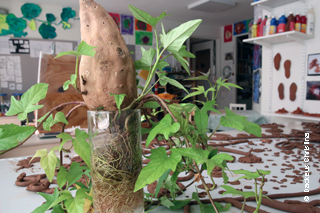 On the 14th May, as part of our conference on the work and influence of Loris Malaguzzi, our friend and colleague Professor Gunilla Dahlberg will be discussing the transforming of awareness and practice amongst Swedish educators and preschools in the Swedish Reggio Emilia Network. The intriguing title comes from child's question in one of their schools, which helped the educators develop.
On the 14th May, as part of our conference on the work and influence of Loris Malaguzzi, our friend and colleague Professor Gunilla Dahlberg will be discussing the transforming of awareness and practice amongst Swedish educators and preschools in the Swedish Reggio Emilia Network. The intriguing title comes from child's question in one of their schools, which helped the educators develop.
It is a journey of 'learning to listen' – going beyond 'doing': "When we began we loved the idea of project work – but we didn't actually listen to the children!"
This session will be a unique opportunity for UK early childhood and Foundation Stage educators endeavouring to develop learning environments sharing the principles evident in Reggio Emilia, to encounter the parallel learning journeys of other Northern European educators who have faced the same problems, and to exchange ideas. Gunilla will bring with her for discussion detailed examples of educators and children's interactions illustrating key moments in their experiences thus far.
Gunilla is a professor of pedagogy at the Department of Child and Youth Studies at the University of Stockholm and an internationally recognised researcher. Her ideas have made her a frequent lecturer in "early childhood education". She believes that traditional teaching ignores the children's full potential. Changing this requires a new view of the child, and also of the role of teaching. "Our starting point is that children are exploring the world and trying to create meaning. Being attentive to their creation of meaning creates desire, and when children have desire, they also learn other factual knowledge. A teacher does not possess all knowledge. A learning teacher must listen to the child with all senses. In 1988 a group in Sweden started discussing why so many Swedish pedagogues were attracted by the pedagogical philosophy of Reggio Emilia. After a couple of years we came to realise that there was no pedagogical practice in Sweden that really took such a perspective seriously. A large gap existed between [ideas] and [practice]. It seemed … that it was relatively easy to take on a view of the child as equipped with huge potential, or of the educator as a as a reflective, co-constructive practitioner – at a surface level. But at a deeper level, what did the Reggio philosophy really mean, both theoretically and in relation to practice?" (Gunilla Dahlberg in Beyond Quality in Early Childhood Education & Care: Dahlberg, Moss & Pence)
Here is some more information for you: it should prove an inspiring occasion for all of us who are, like Gunilla and her colleagues, trying to develop education to better listen to our children.

